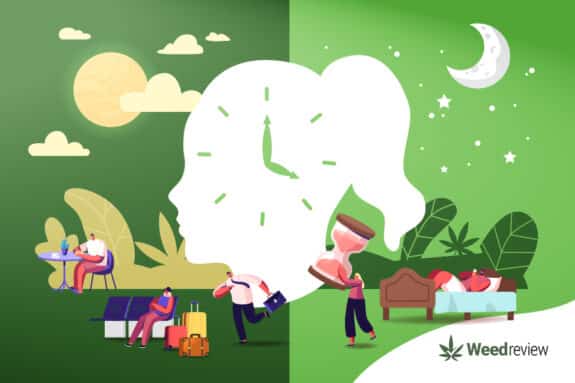
THC for Sleep: Benefits, Risks, How to Use Tetrahydrocannabinol for Sleep

Table of Contents
Marijuana has been used for medicinal purposes for centuries and is becoming increasingly popular as a sleep aid. One of the compounds found in the plant, tetrahydrocannabinol (THC), has been shown to have promising effects on sleep – but with some concerns.
In this article, we will explore the effects of THC cannabis on sleep, how to use it safely and effectively, and potential risks and side effects to be aware of.
A quick intro to THC
THC is the main psychoactive chemical found in cannabis and is known for producing feelings of euphoria and relaxation. The high you feel when smoking ganja, the laughter, hunger, paranoia, and anxiety – it is all because of THC.
THC binds to the receptors of the endocannabinoid system (ECS) in the brain and body upon consumption. The ECS is responsible for regulating several key processes, such as pain, sleep, mood, and appetite. When THC takes over the ECS, it can lead to intense mental and physical effects.
Some believe that by supercharging the ECS with cannabis, THC can improve sleep quality. However, the relationship between THC and sleep is not straightforward.
Scientific research: THC and sleep
The effects of THC on sleep have been studied extensively over the years, with researchers exploring how it can affect sleep quality, duration, and onset. The findings are mixed.
Here’s what the research has found:
- Studies have shown that THC can help with falling asleep faster and staying asleep longer. Taking THC can reduce the time it takes to fall asleep (sleep latency) and increase the hours of sleep and the time spent in the slow-wave sleep stage. Short-term use can also increase the time spent in deep sleep.
- THC may also help reduce the amount of time spent in REM sleep, which is the stage of sleep where dreams occur. This can be helpful for people who experience nightmares or have PTSD, as it may reduce the occurrence of disturbing dreams. However, REM sleep is also important for memory formation and overall cognitive function, so reducing it too much could negatively affect these functions.
- THC can help with chronic pain and other health conditions, which may contribute to sleep disturbances.
- A retrospective chart review study of patients with insomnia and sleep disorders noted some improvement in symptoms. The study also found that cannabis use was associated with a decreased use of prescription sleep medications.
- The effects of THC on sleep can be dose-dependent. Low doses of THC may have sedative effects, while medium to high doses can be mentally stimulating. This can interfere with sleep quality and lead to grogginess and impairment the next day.
- THC can affect the circadian rhythm, the internal biological clock regulating the sleep-wake cycle. THC affects the release of certain hormones like melatonin that regulate the circadian rhythm. This impact on melatonin secretion is why cannabis is often used for sleep.
- One potential downside of using THC as a sleep aid is that it can lead to tolerance and dependence, particularly long-term use. This means that users may need higher doses of THC over time to achieve the same sleep-inducing effects. Moreover, suddenly stopping THC use can cause withdrawal symptoms and contribute to poor sleep in heavy users.
- Long-term use of THC has also been associated with some sleep issues, including sleep apnea, snoring, and disruptions in the sleep cycle. It can affect sleep architecture and change the time spent in different sleep stages.
While THC has sedative properties that can help with falling asleep and increasing sleep time, there are also potential drawbacks to using it as a sleep aid, particularly with chronic, long-term use.
As with any medication, you should consider the potential for addiction and withdrawal symptoms. Future studies with large sample sizes are needed to fully understand the effectiveness and safety of using medical cannabis for sleep.
THC products for sleep
There are many cannabis products in Thailand that you can take for a night of good sleep. It all boils down to your preference.

Flowers
Different strains of cannabis can have different effects on the body and mind. For example, Indica strains are thought to be more relaxing and sedating, while sativa strains are more energising and uplifting. For sleep, choosing an indica or indica-dominant hybrid strain is usually recommended.
Consider using strains like Northern Lights, Grandaddy Purple, Gorilla Glue, or other Indicas.
Gummies & edibles
Edibles are food products that have been infused with cannabis extracts. They offer a more long-lasting effect and can take up to an hour or more to take effect.
Marijuana gummies are a popular choice as they come in small doses and are easy to eat. The effects of edibles can be unpredictable if the dosage is not monitored and may vary based on factors such as body weight, metabolism, and tolerance.
Oil & tinctures
THC oils, also known as cannabis oils, are a form of tincture that can be consumed by placing a few drops under the tongue. They have a quicker onset than edibles and a longer-lasting effect than smoking.
How to use THC for sleep
While THC has been shown to have potential uses for sleep and improving quality of life, you must remember that it is intoxicating with the potential for dependence.
Hence, it is important to use it in a way that maximises its benefits while minimising potential risks. Here are some tips on how to use THC for sleep:
Start with a low dose
As with any new medication or supplement, start with a low dose, go slow, and gradually increase as needed.
Like CBD, there is no universal dosage guideline for how much THC you should take for sleep. The answer depends on your weight, metabolism, and tolerance. You may need to experiment with different amounts and cannabis products until you find the sweet spot.
Timing is key
It is best to take THC about an hour before bedtime to give it time to take effect. Taking it too early could make you feel drowsy during the day, while taking it too late could interfere with your ability to fall asleep.
It also depends on the product you are taking. If you are taking sleep gummies, you may want to eat them an hour or so before to give your body time to digest them. With oils and flowers, the effects of cannabis kick in faster.
Speak to your doctor
You should also consider talking to your doctor if you plan to take medical marijuana for chronic insomnia or other sleep-related disorders like sleep apnea. Since long-term THC use can be problematic, it is best to approach it with a professional who can help you figure out the correct dosage and products.
Potential side effects
While THC can be an effective sleep aid for some, it carries certain risks and side effects. Here are some things to keep in mind:
| Short-term effects | Long-term effects |
|---|---|
| Impaired memory and concentration | Impaired lung function (with smoking) |
| Impaired coordination and reaction time | Dependence and addiction |
| Dry mouth | Increased risk of mental health problems |
| Red eyes | Reduced effectiveness over time (tolerance) |
| Increased heart rate | Changes to the sleep cycle |
| Nausea, vomiting |
THC can affect different people differently, and the risks and side effects may vary depending on the individual.
Drug interactions
THC can prevent certain medications from doing their job correctly, such as blood thinners and antidepressants, leading to adverse effects. If you are taking medicines and want to add medical marijuana into your routine, speak to your doctor for the best course of action.
Moreover, pregnant people should avoid using THC due to the potential harm to the fetus and the increased risk of pregnancy complications.
Conclusion
THC has shown promising results in promoting healthy sleep in people with sleep disorders. It can help reduce the time it takes to fall asleep, increase sleep duration, and improve overall sleep quality. This should be followed with proper sleep hygiene and practices for best results.
There are potential risks and side effects associated with THC use. Heavy uses of THC can lead to higher tolerance and dependence, making it less effective as a sleep aid over time. Further research is needed to fully understand the long-term effects of THC use on sleep and determine safe and effective dosages.
Before using THC for sleep, talk to your doctor and carefully consider the potential risks and benefits. In the meantime, you may consider checking CBD as a sleep aid to see if it is a better fit for you.


